After two successful years of running a fully online summer internship program, the staff of the Middlebury College Museum of Art were pleased to host five paid interns on campus from 26 June–19 August 2022. During this time, interns learned about potential career paths and explored the essential role that art and natural history museums and institutions play in their communities.
For 8 weeks, interns worked with supervisors on projects (described below) at the Middlebury College Museum of Art, the Special Collections & Archives division of Middlebury College’s Davis Family Library, the Henry Sheldon Museum of Vermont History, and Middlebury College’s Bicentennial Hall.
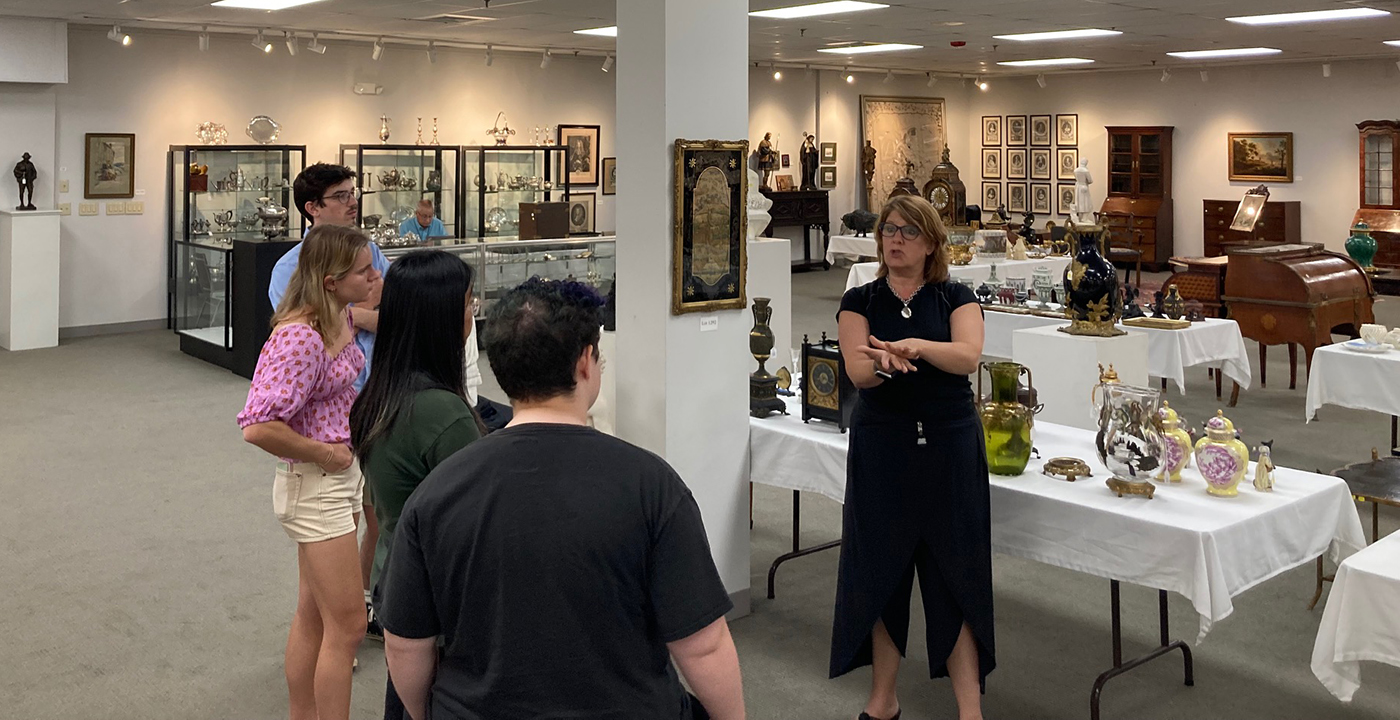
In addition, 1-2 days each week for 6 weeks, interns gathered for professional development comprised of:
- Group discussions about accessibility in the arts, decolonizing museum practice in cultural centers and natural history museums, equitable and accessible digital access to the arts, the history of American museums, mindfulness practices in the arts, museum ethics, and repatriation. (Click on the links to sample some of these readings and videos.)
- Career conversations with a variety of experienced professionals including an art conservator, art museum curator, art museum director, art museum educator, art museum registrar, archivist, arts accessibility specialist, auction house representative, community art activist, folklorist, fundraiser, gallerist, grant writer, library director, natural history collections manager, and provenance specialist.
- Field trips to the Beneski Museum of Natural History at Amherst College, Bonhams Skinner Auction House, the Bread & Puppet Museum, deCordova Sculpture Park and Museum, Edgewater Gallery, the Fairbanks Museum & Planetarium, Hancock Shaker Village, the Henry Sheldon Museum of Vermont History, Ilsley Public Library, Massachusetts Museum of Contemporary Art (MASS MoCA), the Middlebury College Museum of Art, the Museum of Fine Arts, Boston, Museum of Everyday Life, Special Collections & Archives at Middlebury College’s Davis Family Library, the St. Johnsbury Athenaeum, the Vermont Folklife Center, and the Williamstown Art Conservation Center.
- Career counseling
Interns and program administrators would like to thank the internship supervisors for their mentorship.
MuseumWorks is made possible by the generous financial support of Cookie S. Tager, MA ’66 and members of Middlebury’s Museum & Visual Arts Council.
The Interns
 Aidan Cornelius ’24 (he/him)
Aidan Cornelius ’24 (he/him)
Middlebury College Museum of Art
I am a rising junior from Fairport, New York. I am majoring in History and minoring in French. I am looking forward to exploring how museums can best serve their communities and how accessibility to museum resources can be maximized. After Middlebury, I would like to facilitate community-museum interaction and improve access to collections. In my free time, I enjoy hiking, playing soccer, and finding new music.
Working at the Middlebury College Museum of Art this summer has given me a comprehensive look at work life in small museums. I began my experience researching pieces for an upcoming exhibition and writing up museum labels based on information I could find in all sorts of sources; I sifted through autobiographical, academic, and journalistic texts. These projects took up the majority of my time, however, I did get the chance to work on multiple other projects at the same time. These included: mailing our collection handbooks out to contributors and friends of the museum, helping our preparators on deinstalling our rotating gallery, working with our preparators on framing and unframing pieces whilst taking them in and out of storage, and contacting art dealers and galleries about acquiring pieces for another upcoming exhibition. Therefore, I have had the opportunity to experience working in many different facets of museum operation, all of which I have enjoyed for their own unique reasons and I believe have given me a very well-rounded experience.
As for MuseumWorks’ professional development curriculum, I felt that our readings and discussions surrounding decolonizing and repatriation projects were extremely interesting. The Middlebury College Museum of Art has a Benin bronze which is a piece that has some controversial provenance, as so many of its kind do. I do feel that the museum is taking the right steps, but I am interested in what the future holds for similar pieces, such as those on display at the Museum of Fine Arts Boston. I feel that decolonizing museums is an inevitable part of validating the collections of museums and increasing accessibility to collections around the world. I hope that if my career continues in this field, I can be a part of these conversations and hopefully help work through on such projects.
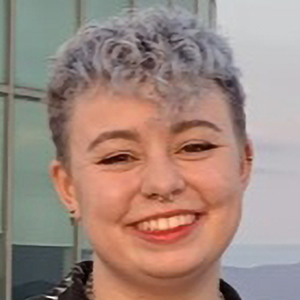 Devon Hunt ’23 (they/she/he)
Devon Hunt ’23 (they/she/he)
Henry Sheldon Museum of Vermont History
I am from West Hartford, Connecticut. I major in Anthropology and minor in Theatre. As of now, after college I hope to continue my studies in graduate school, with the ultimate goal of becoming a college professor. This summer I was interested to learn about museum curation, including how museums acquire items and artifacts and how they create curated exhibits. Outside of my studies, I like to dance, I’m a huge fan of k-pop, and I’m a drag king!
When I started working at the Sheldon Museum, I wasn’t exactly sure what I would be doing. “They have all of the exhibits up already,” I thought, “what else is there to do?” The answer is quite a lot. In addition to the museum, the archives is always doing work and helping researchers on various projects. The museum itself always has a lot of work to do, as well. We host events and community outreach, we share updates with thousands of people via email blasts, and more. My primary job has been updating the museum’s website with virtual exhibits from past museum seasons to make the information available to any interested parties. These exhibits stretch far beyond the “rich old white man” history that I somewhat expected, covering everything from contemporary Vermont artists and collectors to the story of a same-sex couple (two women, no less) who lived in and were accepted by the Weybridge community in the 19th Century. Sifting through the vast amounts of information in each exhibit folder makes me realize not only how vast is the subject matter covered by our exhibits, but also how much goes into planning and setup for each exhibit that visitors never see.
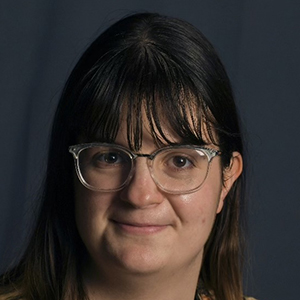 Rachel Peck ’25 (they/them)
Rachel Peck ’25 (they/them)
Special Collections & Archives division of Middlebury College’s Davis Family Library
Hi! I’m from Cambridge, United Kingdom. I am double majoring in History and Film! This summer I was excited to get to know Middlebury (the college and the place) through the Special Collections archive and to learn about the history and people of Middlebury! In my free time I like to cook for my friends, read books, and go on long night walks.
I hadn’t truly realised how much the academic year eats in to my time until this summer. Working in Special Collections in the basement of Davis, I went from the hectic and ever changing regime of a semester where my focus is on everything everywhere all the time to a much slower and more focused pace. For 8 hours a day, I was immersed in the archive, spending my days with what I love more than anything: books! From my first day I was blown away by the scope of material housed in the intricately organised archive. I will never forget opening the front cover of “Common British Beetles,” a selected text for a Natural History class, to see someone had etched the names of the four Beatles under the title in pencil. This was one of many small moments that peeled back layers of history that go into a text.
But it wasn’t just books that I spent time with in the archive: I organised and catalogued over 120 folders of records and papers relating to the Commons System [the residential system, in place from the late 1990s until 2020, that divided all Middlebury College students into five housing / academic / social clusters]. At first I was daunted by what seemed like a monotonous and uninspiring task; but I was mistaken. By the end of my project, I’d gained a rich and thorough understanding of how the Commons came to be, the individuals that invested their time in making it happen, and where the need for such a system arose from. The project gave me a new understanding of how the dynamics of our campus today have been influenced and crafted by its history in a way that is entirely unique. My summer in the Archive proved to be so much more than I expected; and I am incredibly grateful to have been given the opportunity to feel such passion and inspiration every day.
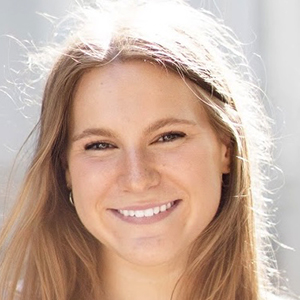 Sarah Mines ’24.5 (she/her)
Sarah Mines ’24.5 (she/her)
Henry Sheldon Museum of Vermont History
Hi! I am a rising junior Feb from Austin, Texas majoring in Architectural Studies and minoring in Math. This summer, I was excited to learn from the staff at the Henry Sheldon Museum about how they curate exhibits to showcase local art for the people of Middlebury and Vermont as a whole. In my free time I like to play water polo, hike with friends, and listen to podcasts!
Through the MuseumWorks Summer Internship Program I have had the opportunity to visit and learn about a variety of different libraries, archives, history museums, natural history collections, art museums, and professions within these industries. I worked at the Henry Sheldon Museum of Vermont History in Middlebury as an intern. The Museum’s mission is to “Collect, preserve and share the historic, artistic, and cultural heritage of Middlebury, Addison County, Vermont, and the surrounding region for the enjoyment and edification of current and future generations.” Without the attention of local institutions, the history and art of local areas may be lost or destroyed throughout time. I believe in The Henry Sheldon Museum’s mission to fulfill these goals by archiving Addison County’s history and thinking critically about the role that museums can play in shaping a community’s recorded history.
I had the privilege of helping the museum market their events and exhibits using social media posts, graphics, maps, and flyers. I enjoyed helping develop their marketing strategies and getting the word out about all that they do to bring value to the community. In our professional development sessions and field trips, I was fascinated by how many careers and paths there are within the museum and art world, and how interconnected they are to other industries such as fundraising and social justice work. One conversation that stood out to me was our meeting with Monica Sadler, Curator for Provenance at the Museum of Fine Arts, Boston. She described the complicated and necessary process of ensuring ethical acquisitions and how a museum might go about returning artwork to its rightful owners.
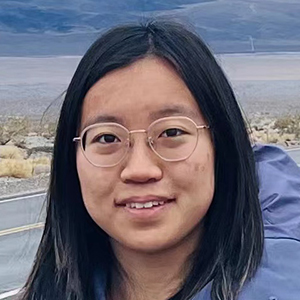 Sylvie Lyu (she/her)
Sylvie Lyu (she/her)
Biology Department, Middlebury College.
I am a rising junior studying Biology and Studio Art, and I’m from Beijing, China. This summer, I worked at the Natural History Collection in BiHall. Believing the study of natural history to be a profoundly spiritual journey, I was excited to explore ways to preserve specimens and to convey our evolutionary past to a broad audience. In my free time, I love to write poems and short stories and do drawings. Two of my favorite artists are Frida Kahlo and Ernst Haeckel.
This summer, I had the privilege of helping the Middlebury College Biology Department build a Natural History Collection from scratch with the guidance of Prof. Alexis Mychajliw. The Biology Department owns thousands of specimens of birds, mammals, fish, amphibians, invertebrates and plants. I made a digital catalog of all the vertebrate specimens, recording their preservation status and preparation information on their labels. Then, to learn the stories behind our collection, I looked into the letters and articles written by the two major bird collectors, Albert Mead and Chester Parkhill. Most of our bird skin specimens are local to Vermont, collected between 1886 and 1890, so they provide valuable insights into local ecological changes over the past two centuries. Most preparators in the 1800s preserved specimens with toxic materials; to develop a protocol for handling the collection safely, I scanned the birds for arsenic, mercury and lead with the X-Ray Fluorescence machine, and found the three elements present in all historical specimens. I presented my findings to the Middlebury community at the Summer Research Symposium.
My work—which will continue in the fall—has been an interdisciplinary endeavor in understanding the cultural context of specimen preparation and display. What has prompted scientists and natural history lovers to transform living organisms into taxidermy specimens? How has the perception of animal specimens changed in the Middlebury community and the American society as a whole over the past centuries? During my work I read about the chilling racist history behind human specimen collection. While animal taxidermy does not seem nearly as controversial, do some of such philosophical assumptions go into their preparation as well? I will continue building the Middlebury Natural History Collection with these questions in mind, firmly believing that the specimens, more than fixed objects, are the embodiment of complex, fluctuating social narratives.
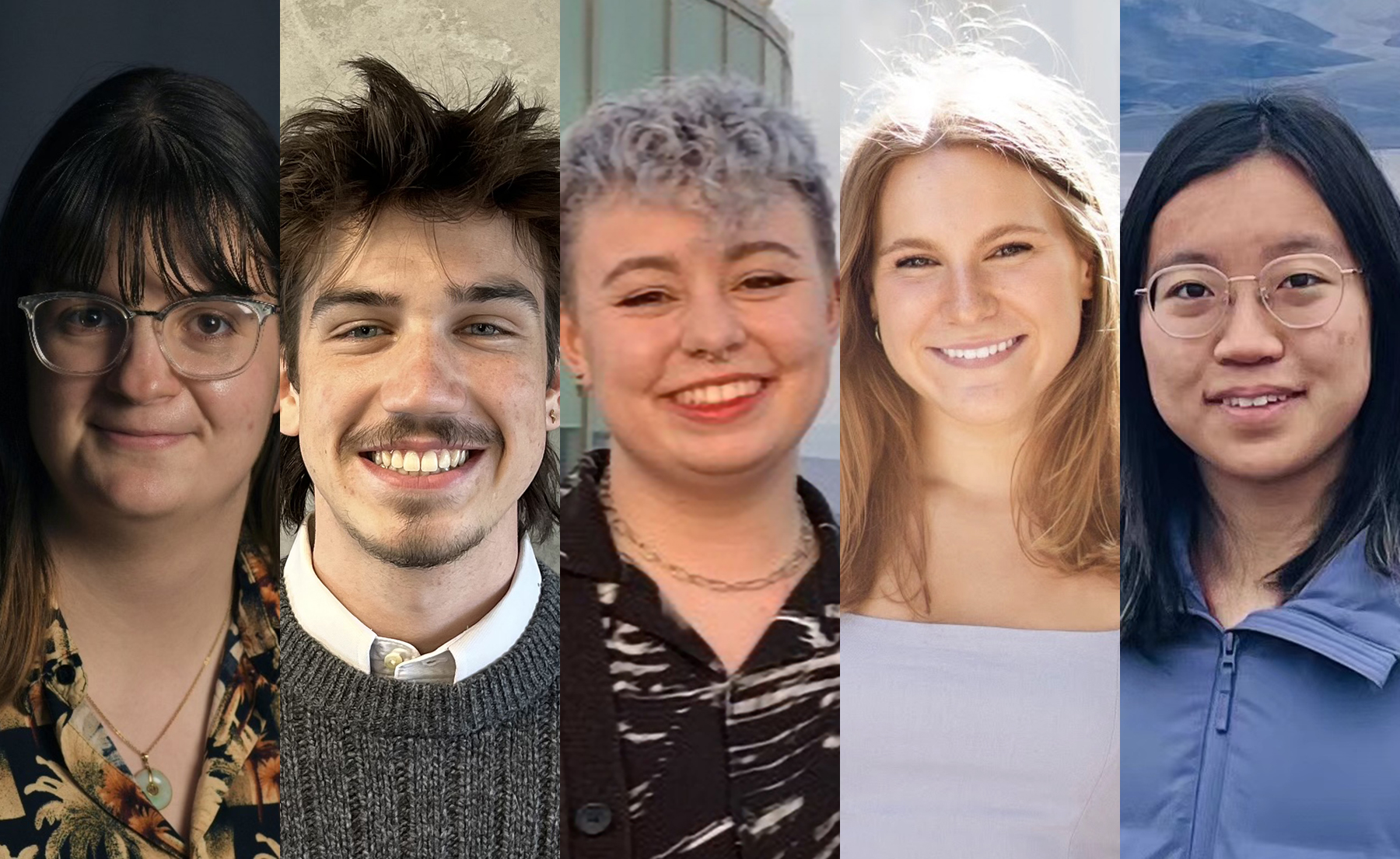
Such great young people carrying the torch! Exciting times ahead for the Middlebury Museum of Art!